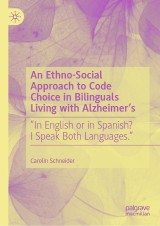Details

An Ethno-Social Approach to Code Choice in Bilinguals Living with Alzheimer's
“In English or in Spanish? I Speak Both Languages.”|
117,69 € |
|
| Verlag: | Palgrave Macmillan |
| Format: | |
| Veröffentl.: | 24.12.2023 |
| ISBN/EAN: | 9783031464836 |
| Sprache: | englisch |
Dieses eBook enthält ein Wasserzeichen.
Beschreibungen
<p>This book examines the under-researched field of communication by bilingual people with dementia of the Alzheimer's type (DAT). The aging population is increasingly affected by neurocognitive diseases such as DAT, and over the past 30 years, the growing research body concerned with monolingual DAT discourses has seen significant growth. The findings from monolingual studies and institutional settings highlight the importance of code choice for a person’s sense of autonomy, especially against the background of changing communicational abilities. Adding a new perspective, this book investigates how ten Puerto Rican speakers living with varying stages of DAT draw on their bilingual resources to accomplish verbal interaction in informal settings with their primary care partners. Drawing on narrative interviews conducted in Orlando, Florida, this multi-case study investigates situated language choices and code-switches by applying the ethno-social approach, i.e. combining features of conversation analysis and ethnography of communication. The author sheds light both on the question of how people living with DAT engage in conversations and which strategies they employ in their languages (English and Spanish) to reach their communicative goals. Specifically, by analyzing the role of code choice and code-switching in a qualitative manner, two main functional categories emerge: discourse-related and participant-related code-switching. Bilingual competencies remain even among participants living with severe DAT symptoms, as evident in retained interactional sequences such as salutations. Persons living with DAT competently negotiate code, either through exploratory code-switching or metalinguistic commentary, emphasizing the need for conversational partners to be sensitive to the communicative needs, in both languages, of speakers living with DAT. This book will be of interest to students and researchers working on dementia discourses, health communication, multilingualism and ageing, as well as Bilingual/ Multilingual families or individuals living with dementia.<br></p>
<p>Chapter 1: Preparing the Grounds – Making a Case for Conversational Dementia Research in an Increasingly Multilingual World.- Chapter 2: Understanding the Continuum of Dementia of the Alzheimer’s Type and Communication Profiles in its Context.- Chapter 3: Working towards an Understanding of Structural and Functional Approaches to Bilingualism and Code-Switching.- Chapter 4: The Intersection of Bilingualism and DAT Discourse – Psycholinguistic, Sociolinguistic and Interactional Perspectives.- Chapter 5: Establishing a Conversational Corpus of Bilingual Speakers living with DAT and the Ethno-Social Approach.- Chapter 6: The (Linguistic) Tapestry of the Dataset – Exploring Participation, Direction, Topic, and Language Choices.- Chapter 7: The Formal Characteristics of the Bilingual Turns and Turn Boundaries.- Chapter 8: Disentangling Code-Switches from a Socio-functional Angle.- Chapter 9: Drawing on Language Repertoires in Bilingual Conversations throughout the progression of DAT – ADiscussion.- Chapter 10: Synopsis, Implications, and Future Directions.</p>
<p><b>Carolin Schneider</b> is a post-doctoral researcher and lecturer in English Linguistics at the University of Duisburg-Essen, Germany. Her research areas include multilingualism, (critical) discourse analysis and interpersonal pragmatics in online and offline contexts.<br></p>
<p>“Carolin Schneider asks daring questions about bilinguals living with dementia that are seldom asked and even less frequently answered – and moves not only to answer them with her case studies of ten bilinguals with DAT but also to make readers aware of the importance of the issue.”</p><p>—Boyd Davis, Tongji University, China</p>This book examines the under-researched field of communication by bilingual people living with dementia of the Alzheimer's type (DAT). With an aging population increasingly facing neurocognitive conditions like DAT, there has been substantial growth in research, particularly focusing on monolingual DAT communication, over the past three decades. Previous studies have underscored the significance of language choice for preserving a person's sense of autonomy amidst changing communication abilities. Adding a new perspective, this book investigates how ten Puerto Rican individuals at various stages of DAT utilize their bilingual abilities in informal interactions with their primary caregivers. Through narrative interviews conducted in Orlando, Florida, this multi-case study employs an ethno-social approach that combines elements of conversation analysis and ethnography of communication. The author sheds light both on the question of how people living with DAT engage in conversations and which strategies they employ in their languages (English and Spanish) to reach their communicative goals. By qualitatively analyzing the role of code choice and code-switching, two primary functional categories emerge: discourse-related and participant-related code-switching. Individuals living with DAT adeptly navigate code choice, either through exploratory code-switching or metalinguistic commentary, underscoring the importance of conversational partners' sensitivity to their language needs in both languages. This book will be of interest to students and researchers working on dementia discourses, health communication, multilingualism and ageing, as well as bilingual/multilingual families or individuals living with dementia.<p></p><p> </p><p><b>Carolin Schneider</b> is a post-doctoral researcher and lecturer in English Linguistics at the University of Duisburg-Essen, Germany. Her research areas include multilingualism, (critical) discourse analysis and interpersonal pragmatics in online and offline contexts.</p><p></p>
Examines the linguistic abilities of bilingual speakers living with dementia of the Alzheimer’s type Provides examples of how conversation in two languages may function when one of the speakers lives with dementia Qualitatively focuses on language material from ten triadic conversations

















